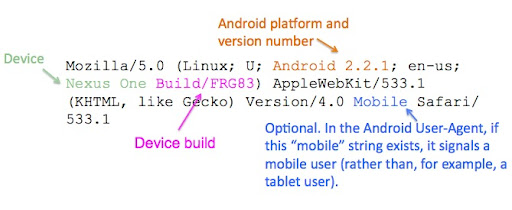Wednesday, March 30, 2011
Here's a trending User-Agent detection misstep we hope to help you prevent: While it seems completely reasonable to key off the string "android" in the User-Agent and then redirect users to your mobile version, there's a small catch... Android tablets were just released! Similar to mobile, the User-Agent on Android tablets also contains "android," yet tablet users usually prefer the full desktop version over the mobile equivalent. If your site matches "android" and then automatically redirects users, you may be forcing Android tablet users into a sub-optimal experience.
As a solution for mobile sites, our Android engineers recommend to specifically detect "mobile" in the User-Agent string as well as "android." Let's run through a few examples.
With a User-Agent like this:
Mozilla/5.0 (Linux; U; Android 3.0; en-us; Xoom Build/HRI39) AppleWebKit/534.13 (KHTML, like Gecko) Version/4.0 Safari/534.13
Since there is no "mobile" string, serve this user the desktop version (or a version customized for Android large-screen touch devices). The User-Agent tells us they're coming from a large-screen device, the XOOM tablet.
On the other hand, this User-Agent:
Mozilla/5.0 (Linux; U; Android 2.2.1; en-us; Nexus One Build/FRG83) AppleWebKit/533.1 (KHTML, like Gecko) Version/4.0 Mobile Safari/533.1
Contains "mobile" and "android," so serve the web surfer on this Nexus One the mobile experience!
You'll notice that Android User-Agents have commonalities:

While you may still want to detect "android" in the User-Agent to implement Android-specific features, such as touch-screen optimizations, our main message is: Should your mobile site depends on UA sniffing, please detect the strings "mobile" and "android," rather than just "android," in the User-Agent. This helps properly serve both your mobile and tablet visitors.
For questions, please join our Android community in their developer forum.
